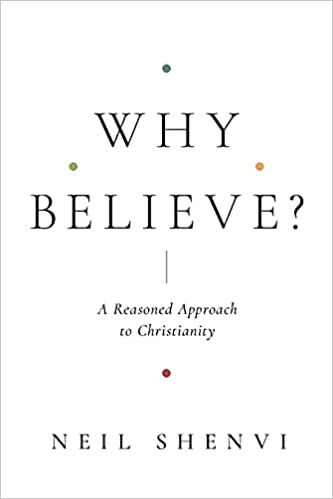A Brief Book Notice from Books At a Glance
by Fred G. Zaspel
Shenvi provides clear, popular-level answers to some of the most important questions posed to Christians by contemporary skeptics. And he poses some questions of his own. Here is a sample from chapter 4.
Why Is Mathematics So Successful?
The success of mathematics in describing the universe is a fact that most of us, even scientists like me, take for granted. Yet it is actually extremely surprising. Nobel Prize–winning physicist Eugene Wigner wrote an article over fifty years ago entitled “The Unreasonable Effectiveness of Mathematics in the Natural Sciences,” in which he repeatedly used the word “miracle” to describe this phenomenon. Why, he asked, do the same beautiful mathematical equations apply uniformly across all time and space? We could easily conceive of a universe that is wholly haphazard and chaotic, described by no underlying mathematics at all. Or we could conceive of a universe that is sporadically chaotic, where the laws of physics are occasionally suspended or altered every few years. Or we could conceive of a universe in which the laws of physics are not universal; they could vary from planet to planet or from galaxy to galaxy. Instead, we observe a universe with a deep and beautiful underlying mathematical structure that appears to be universal in space and time. Wigner asked why this should be the case; what is the explanation for this phenomenon?
In addition to the mathematical structure of the universe, Wigner called attention to another unusual and “miraculous” phenomenon: that human beings are able to perceive and understand this structure. This fact is also quite surprising. After all, while one might argue that evolution would produce organisms with enough intelligence to flee from tigers or to avoid falling off cliffs, why are human beings unique in their ability to comprehend quantum mechanics or molecular biology? Surely, these activities didn’t confer any reproductive benefit on hunter-gatherers foraging for fruit and fending off predators. Why should we expect human beings to understand science and mathematics any better than other intelligent animals like chimpanzees or dolphins?
(Shenvi then proceeds to examine the answers given by atheism, and then by theism.)
Table of Contents
1 Introduction
Should We Avoid Religious Truth Claims for the Sake of Peace?
Are All Religions True?
Is All Religious Truth Subjective?
Can We Just Ignore Religion?
2 The Trilemma
Liar, Lunatic, or Lord
The Historical Reliability of the Gospels
Jesus’s Claims
Objections to the Trilemma
A Final Suggestion
3 The Resurrection
The Significance of the Resurrection
Evidence for the Resurrection
Naturalistic Explanations
Seeking the Best Explanation
Objections to the Resurrection
In Conclusion
4 God and Revelation (Part 1): Nature
Why Is Mathematics So Successful?
What Caused the Universe?
Why Is There Something rather than Nothing?
Why Is the Universe Finely Tuned for Life?
Objections to a Theistic View of the Universe
Evidence and Worship
5 God and Revelation (Part 2): The Moral Law
How Can Objective Moral Values and Duties Exist?
Why Should We Seek the Truth?
Revelation and Scripture
Evidence and Commitment
6 Arguments against God
The Problem of Evil
Evolution
The Hiddenness of God
7 The Gospel (Part 1): The Uniqueness of Christianity
Christianity on Sin and Salvation
Buddhism on Sin and Salvation
Hinduism on Sin and Salvation
Islam on Sin and Salvation
Judaism on Sin and Salvation
Problems and Solutions
8 The Gospel (Part 2): Christianity and Sin
Are We Radically Morally Corrupt?
Sin in the World
Sin in Our Hearts
9 The Gospel (Part 3): Christianity and Salvation
Sin as Transgression
Sin as Slavery
The Gospel of Grace
Objections to the Christian View of Salvation
10 Conclusions
What’s Missing from This Book
The View from Somewhere
The Logic of Repentance
By Grace through Faith
The Good News of the Kingdom
The Step of Faith
A helpful read! Well-informed yet accessible. Excellent for distribution to Christian laymen and to unbelievers.
